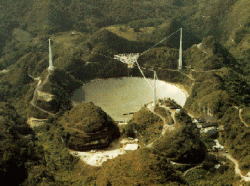If your New Year’s resolutions include trying something new, expanding your horizons, or doing something to benefit humanity, this is for you: SETI@home needs more volunteers to help crunch data in the search for extraterrestrial intelligence (SETI). And the easy part is that your desktop computer does all the work.
SETI uses radio telescopes to listen for narrow band-width radio signals from space. Since these signals don’t occur naturally, a detection of such a signal would indicate technology from an extraterrestrial source.
The SETI project at the University of California-Berkley gets data from world’s largest radio telescope in Arecibo, Puerto Rico, which has recently been updated with seven new and more sensitive receivers. The improved frequency coverage for the telescope is now generating 500 times more data for the SETI project than before, and more volunteers are needed to handle the increase in data.
According to project scientist Eric Korpela, the new data amounts to 300 gigabytes per day, or 100 terabytes (100,000 gigabytes) per year, about the amount of data stored in the U.S. Library of Congress. “That’s why we need all the volunteers,” he said. “Everyone has a chance to be part of the largest public participation science project in history.”
The SETI@home premise is simple but brilliant: Instead of using a monstrously huge and expensive supercomputer to analyze all the data, it uses lots of small computers, all working simultaneously on different parts of the analysis. Participants download a special screensaver for their home computers, and when the computer is idle, the screensaver kicks in to grab data from UC Berkley, analyze the data and send back a report. SETI@home was launched in May of 1999.
The SETI@home software has now been upgraded to deal with all the new data generated by the updated Arecibo telescope. The telescope can now record radio signals from seven regions of the sky simultaneously instead of just one. It also has greater sensitivity and 40 times more frequency coverage.
So, if the phrase “to search out new life and new civilizations” inspires you, her’s your chance to be part of the largest community of dedicated users of any internet computing project. Currently SETI@home has 170,000 individuals donating time on 320,000 computers.
“Earthlings are just getting started looking at the frequencies in the sky; we’re looking only at the cosmically brightest sources, hoping we are scanning the right radio channels,” said project chief scientist Dan Werthimer. “The good news is, we’re entering an era when we will be able to scan billions of channels. Arecibo is now optimized for this kind of search, so if there are signals out there, we or our volunteers will find them.”
Check out SETI@home here.
Original News Source: UC Berkley Press Release


Obviously SETI monitoring narrow band width rf is the way to go. The question is what fraction of a femto watt can we currently detect and amplify? Has anyone thought about this and what was concluded?
Man, this takes me back. I remember when I got on board back in 99 when I received my spanking new PII with 128 Mb of RAM and a 56K dial up modem. I would quaff a half dozen Molsen Ex’s and stare at the screen saver.
I really miss that. ( The Molsen Export that is. I live in Baltimore now and can’t get it here.)
Jamie
Though I have particip[ated as a volunteer for years, I must point out the uselessness of the SETI venture. Mankind (ie: the human race, US) is the only independently intelligent race in existence—anywhere. We are second only to God. There is noone else ‘out there’. The only reason I participate is to prove you wrong.
bobi
How wrong you are, bobi. There are legitimate technical reasons why SETI may be unviable, none of which you mention. However it is statistically undoubtable that we are just one atom in a vast ocean of life, and we are not even comparable to God, who is infinite. We can choose not to believe this, but reality is not beholden to our opinions. Percieving others may take centuries, actually contacting them may take millenia. But in the end, our fellow Earthlings will be no less mysterious than the most alien race, and what we seek in space is really ourselves.
Very intersting
How wrong you are, bobi.